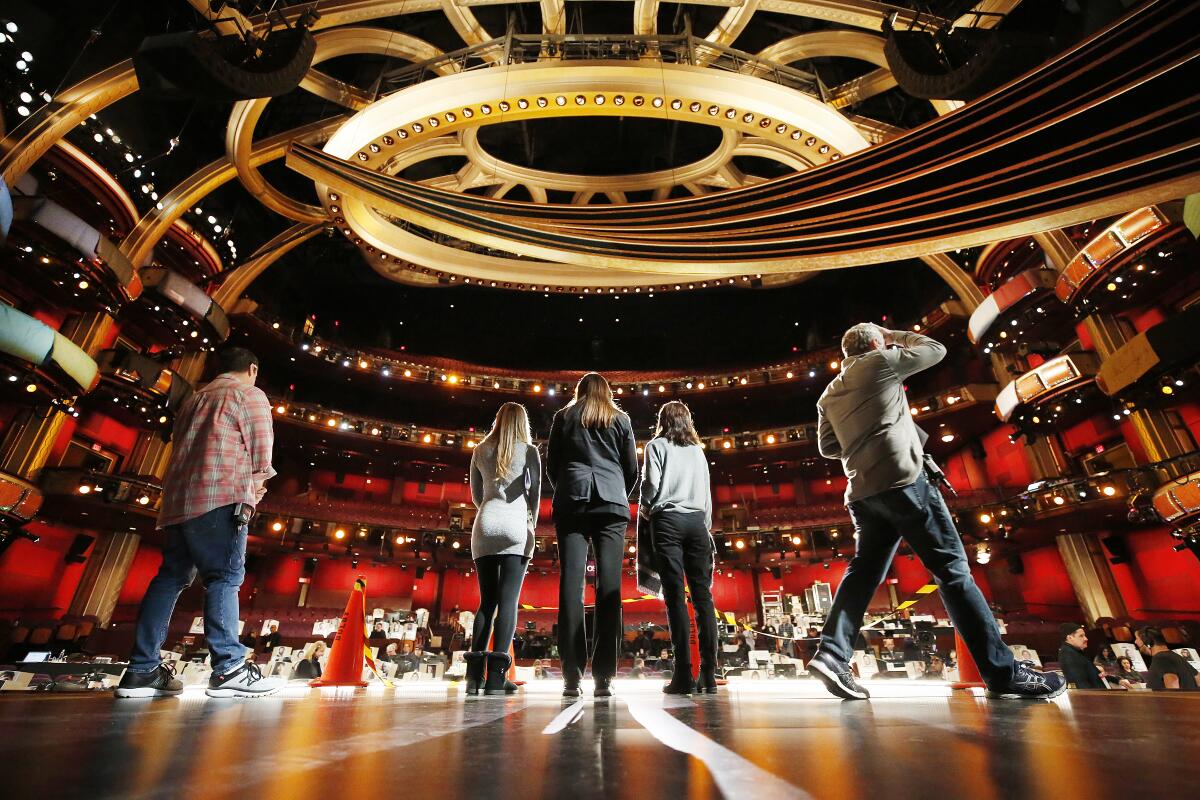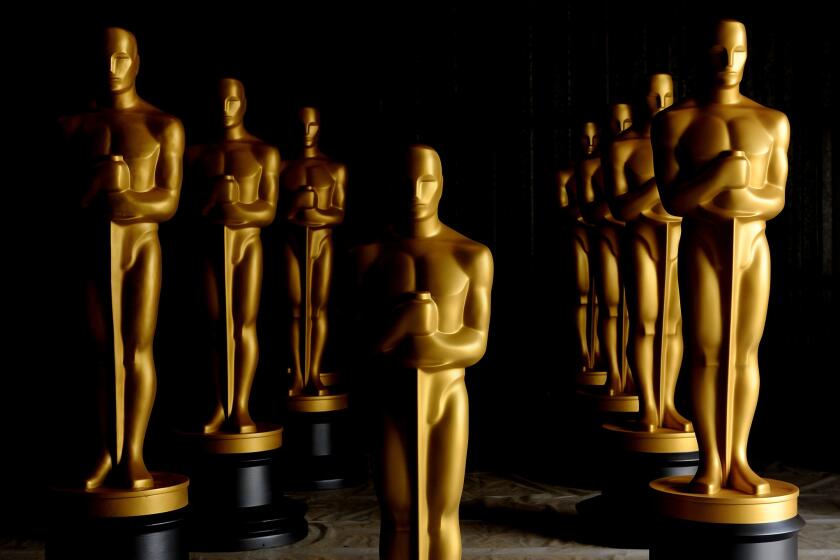Column: Our love-hate relationship with the Oscars only proves how much they matter

- Share via
It happens every year. A friend will suggest a Sunday get-together, a child will ask for a family weekend, my husband will buy tickets for a matinee and I will look at each or all of them with an expression of exasperation. “But, but, that’s the Oscars.”
Like Easter or Hanukkah, the Oscar telecast has no fixed date on the Gregorian calendar, but each year it is announced months in advance with great fanfare. Yet, I am annually shocked to learn that many people do not have the date graven into their consciousness, or even on their smartphone calendar. Over the years, I have forgotten my husband’s birthday, our anniversary and even a school concert or two. But the Oscars? Impossible. They are a fixed point in the city, the industry and the culture I have spent much of my life writing about, a glittering crash of triumph, recrimination and plunging necklines as dependably infuriating as gridlock, as spectacular as the blooming of the jacaranda.
And as divisive as, well, I can’t think of anything that is as divisive in quite the same way. To some, the Oscars are a just an overblown marketing tool, driven by the film industry, the fashion industry, the increasingly desperate media, in hopes of drawing attention that should be focused on more important things. To others, the Oscars are a celebration of one of the few things inhabitants of this world have in common — a love of cinematic storytelling, a quest for truth and illumination through images that hold us captive, together, in the dark.
The Oscars are a touchstone that allows us to to consider and reconsider the essential narratives that guide us, or they are a self-indulgent expression of excess, designed to ensure a social hierarchy that values fame over substance.
I still don’t know what, exactly, I think of the Oscars, and I’ve been covering them, in one way or another, for more than 20 years. And by “one way or another,” I mean pretty much every way possible. I’ve attended the ceremony a dozen times, first in a seat so high I had a better view of the cameras than the participants, then with access that allowed me onto the red carpet, backstage, in the production truck and into the nominee-filled green room and bar, then as a television critic and now as a culture columnist.
I’ve watched this impossibly complicated event as it grew from lists of potential themes and participants on a white board in the show producer’s office to three-plus hours of nearly hitch-free live television. I’ve watched Celine Dion hit her mark during rehearsal, a tiny figure on a great big stage until she began to sing and the empty seats in the very last row of the highest balcony vibrated. I’ve stood shivering next to Judi Dench and Ian McKellen in the post-Governor’s Ball limousine line, watched Hilary Swank comfort Philip Seymour Hoffman as he worried about whom he hadn’t thanked in his acceptance speech, took in the still-remarkable sight of Al Gore walking off stage with a gold statue in his hand and observed the gentle stealth with which stage crew members helped Itzhak Perlman hoist himself from his mobile chair into a chair on a platform that then slid out past the curtains.
As a television critic, I’ve reviewed more than a decade‘s worth of telecasts, and if you think no one cares about the Oscars, try reviewing it. Positive, negative, it doesn’t matter — multitudes will thank you for speaking the truth and multitudes will call for your job. To this day, I say a prayer of gratitude that Twitter was not around in 2009 when I protested the many non-nominee related dance numbers that littered the Hugh-Jackman-hosted telecast because three weeks of endless angry emails was quite enough. (Jackman’s people, meanwhile, responded with grace and good humor by sending me two gold lamé jumpsuits.)
More recently, the striking white maleness of the nominees and winners made the Oscars a flashpoint for larger conversations about racism and sexism, about the need for and perils of diversity initiatives, about the definitions of excellence and the meaning and mandate of awards in general. In response, the film academy has taken remarkable steps to expand its membership and experiment with the telecast, often to the displeasure of some of its members — last year’s announcement that, in the interest of shortening the show, certain categories would be awarded during commercial breaks met with so much pushback that the change was shelved. As was the tradition of a host; when controversy over homophobic jokes Kevin Hart had made in the past resulted in him withdrawing, the Oscars went hostless for the first time in years.
Experience standout Oscar dresses from the last five decades, including Farrah Fawcett’s disco dress and Billy Porter’s tuxedo gown, in augmented reality.
So what does it all mean? Are the Oscars attempting to model institutional change or desperately attempting to remain relevant? Some believe that declining ratings reflect a loss of interest, that people’s need to see and celebrate their favorite stars are met by social media, that engagement with the nominated movies and movies in general has dwindled, replaced by streaming services and YouTube. Some believe that many older viewers find the ceremony too political while younger viewers think it’s not political enough or that awards try to define an art form that should be battling definition not embracing it.
Here’s what I know about the Oscars: They are more than 90 years old and they are still driving. Thirty million people may be a fraction of glory-days viewership, but the glory days are gone, for everyone, and in this time of fractured audiences and multiple platforms that is still a hell of a lot of viewers.
From where and how to watch the ceremony to who and what is nominated, here’s a complete guide to this weekend’s Academy Awards.
And whether you agree with the choice of each winner, or the general preferences/limitations of the academy voters, or the notion of awards at all, an Oscar, for better and worse, is still the most recognizable and referenced honor in the world (and it doesn’t even come with a cash award). Everyone wants to win an Oscar because it is a two-syllable shorthand for success and prestige. Why else would Netflix, a company that is literally based on blowing up the financial and spiritual tenets of the film industry, be campaigning so hard to win best picture? Not because it’s irrelevant.
The Oscars are all the things fans and critics think they are, and those conflicting opinions are proof of the award’s endurance. When no one cares enough to launch a hashtag campaign or publicly protest an omission or “undeserving” win, we can talk irrelevance. As for now, well, it’s been almost a century since roughly 250 filmmakers gathered in the Hollywood Roosevelt Hotel to celebrate the year’s achievement in film. Was it a ploy to draw attention to the still nascent film industry? To raise its status and cultural influence? To sell more tickets and increase the wattage of its stars? You bet it was.
And, man, did it work.
More to Read
Only good movies
Get the Indie Focus newsletter, Mark Olsen's weekly guide to the world of cinema.
You may occasionally receive promotional content from the Los Angeles Times.














